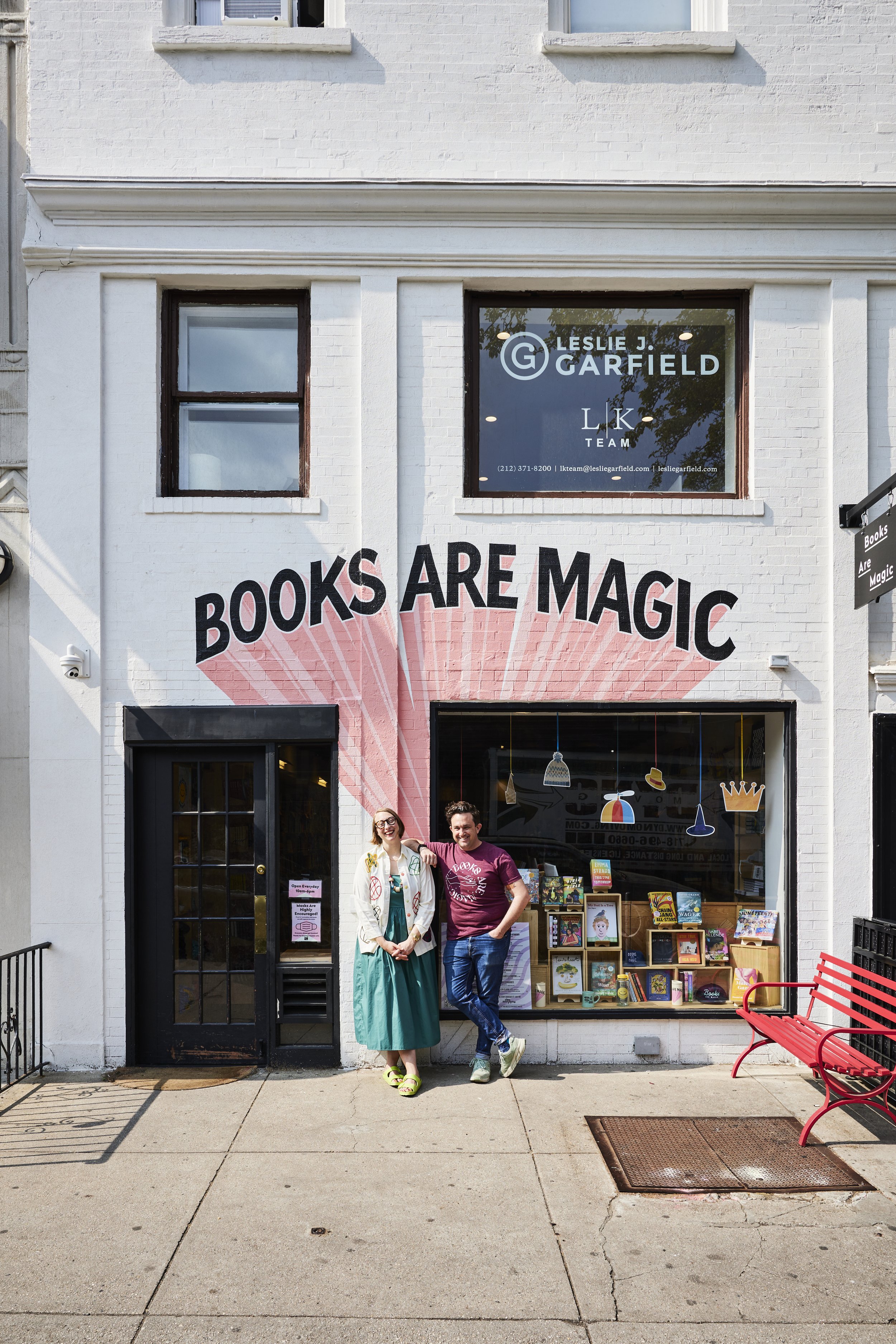The Librarianist v. The Heaven & Earth Grocery Store
The 2024 Tournament of Books, presented by Field Notes, is an annual battle royale among 16 of the best novels of the previous year.
MARCH 28 • ZOMBIE ROUND
The Librarianist
v. The Heaven & Earth Grocery Store
Judged by Johanna Fateman
Johanna Fateman (she/her) is a writer, art critic, and musician. She writes regularly for 4Columns, and often for Bookforum and The Whitney Review. She is a former contributing editor for Artforum and her reviews appeared weekly in the “Goings On About Town” section of The New Yorker for many years. Last summer, her band, Le Tigre, toured for the first time since 2005. Known connections to this year’s contenders: None. / @johannafateman
The Librarianist comes to this contest lightly armed, with a bland protagonist and a slow start. A novel that is initially understated. Precise and accretive, The Librarianist doles out small—then medium and larger—surprises, as it reveals, via extended flashbacks, the backstory of retired librarian Bob Comet. At first, the prose seems almost abstemious, its spare quality thrown into relief by judicious detail. The mint hue of Bob’s house is mentioned several times, as though it’s the only color of note in an otherwise desaturated palette. The suburban mise en scène of the novel becomes more vivid as the friendless Bob begins to wake from years of isolation, volunteering at a senior center—and as we see his detachment and passivity through the lens of old wounds. The action picks up (a little) when he selects Edgar Allen Poe’s The Black Cat to read aloud to a small audience of the center’s clients, who depart in waves, cued by the cat’s mutilation and hanging.
Moments of situational comedy and dark humor leaven The Librarianist’s melancholic realism, but the novel nosedives when it tries too hard to be funny. Its first low point—or the first indication of the novel’s ultimate tenor and direction—is marked by the narration of Bob’s courtship of Connie, the woman he marries, and the betrayal he subsequently suffers. (This is in his early twenties.) Here, The Librarianist introduces wacky Wes Anderson-type characters whose dialogue threatens to destroy the accomplishments of the novel entirely. Bob’s best friend, Ethan, is granted a dry, cocktail-hour wit and ruminative eloquence that seems an outlet for the author’s cleverness more than anything else. Both Ethan and Connie are burdened with extreme, contrived eccentricities, intended to offset or elevate their “ordinariness,” I guess. Meanwhile, weirdly, the promising conceit of Bob the former librarian, using literature to mediate—or to compensate for, or to take the place of—real life is completely abandoned.
He emerges as a sympathetic figure, the mild-mannered star of a few poignant and artfully staged scenes recalling moments in The Royal Tenenbaums, a movie that many people seem to like. And the bittersweet serendipity of the novel’s denouement redeems it in some small way. The Librarianist, with its forced quirks, low stakes, and droll repartee, is, perhaps, just not my cup of tea.
FROM OUR SPONSOR
James McBride’s The Heaven & Earth Grocery Store—the hands-down winner of this pair—is ambitious in scope and form, balancing a zoomed-out mythic dimension with the charming and devastating microcosmic specifics of one community. Though billed as a murder mystery (and, indeed, the 1972 discovery of a body—or a skeleton, rather—is announced on page one), the novel is not a whodunit in the conventional sense. The story begins decades earlier, in a bygone era, in the Pottstown, Pa., neighborhood of Chicken Hill, where Black Americans and European Jewish immigrants coexist, divided but interdependent. It is through a long unfolding and cannily meandering tale of alliances and antagonisms that a corpse is produced.
They are rendered in telling detail, never reduced to types.
Neither population is depicted as homogenous, culturally or morally, and only one character—Chona, the proprietor of the title’s grocery store—has the spiritual-political conviction to forge substantial, emotional (rather than guarded and transactional) intergroup bonds, at least at first. It is this charisma and idealism of hers that also, tragically, attracts the area’s only doctor, a white Christian and a Klansman.
The Heaven & Earth Grocery Store’s omniscient narration captures the interior, psychological landscape of each of its subjects—in brief. They are rendered in telling detail, never reduced to types, yet allowed, for storytelling purposes, to inhabit archetypal roles as heroes, martyrs, and villains. As the plot coalesces around the fate of one of Chicken Hill’s most vulnerable citizens, a disabled Black child called Dodo, everyone plays their part.
Any summary of The Heaven & Earth Grocery Store will inevitably, thanks to the novel’s heartbreaking and heartwarming themes, evoke a degree of corniness, an engagement with humanist clichés; it’s to the author’s credit that he walks, undeterred, right up to the line. The feat of The Heaven & Earth Grocery Store is in its ability to mirror allegorical form, a folkloric mode of resolution, while it leaves the ultimate implications and indictments of the story untidy. In an occurrence both biblical in scale and all-too-common these days, when the truth of the murder is finally revealed (only to us, the readers), a historic hurricane washes the evidence away.
Advancing:
The Heaven & Earth Grocery Store
Match Commentary
with Meave Gallagher and Alana Mohamed
Meave Gallagher: It’s back, baby! Alana, I’m not sure what else I have to say about The Heaven & Earth Grocery Store, except that real-life Pottstown is in the Delaware Valley, so I’ve been secretly imagining everyone sounding like my mother when she talks to her relatives on the Jersey side of the river. Or me when I spend more than a day there. That accent’ll strip paint.
Alana Mohamed: Hello, Meave! Can I just say? I would listen to that audiobook!
Meave: More hyper-specific regional accents!
Judge Fateman’s decision is really excellent, right? Clear, well argued, a little petty where it needs to be. Though maybe now’s the time to say younger Meave absolutely idolized Judge Fateman, and “My My Metrocard” is one of the greatest songs about New York City, I will brook no disagreement.
Alana: Ah, what a moment for younger Meave! But I agree. In addition to giving us a lot to chew on, Judge Fateman also made me laugh.
Meave: Considering the easy-breezy way our judge demolishes The Librarianist—“wacky Wes Anderson-type characters whose dialogue threatens to destroy the accomplishments of the novel entirely”—are you picturing Owen Wilson as Ethan and (beautiful, emotionally detached actress) as Connie now? “Forced quirks, low stakes, and droll repartee.” I am reminded of why I didn’t much care for the book. But it also shows a willingness to engage with the book on its own terms, and what else can you ask for in a judgment?
Alana: Hmm. I think much of her criticism of The Librarianist is directed toward its style. Can one be willing to engage with the style of a book if it’s just not their cup of tea? I wish there had been more quotes from the book—like, please pull out a line of Ethan’s “dry, cocktail-hour wit.” I want to know more! It’s always fun to see criticism voiced so eloquently, though.
Meave: I agree, a specific example or two would further bolster her claims. If I may:
The man’s wife and not mine, that’s right, Bob. It’s a dusty old tale and they’ve written a thousand lousy songs about it but what are you going to do? The wife and I achieved a familiarity. And my understanding had been that she and I would keep this off the books. So maybe it’s that I made a mistake in supporting the understanding, or she made one in betraying it. Either way, here I sit.
Tell me you don’t hear Owen Wilson in a pristine cowboy hat delivering those lines.
Alana: I cannot fault Judge Fateman for reaching for those film references, they’re very appropriate! Also, I deeply appreciated her description of The Royal Tenenbaums as “a movie that many people seem to like.”
Meave: The Heaven & Earth Grocery Store, though, is absolute catnip to our judges—even Judge Minkel, who, in the first matchup of these two novels last round ago, relegated it to Zombieland. I understood each judge’s reasoning, but for me, Judge Fateman most pithily explains the novel’s appeal: “The feat of The Heaven & Earth Grocery Store is in its ability to mirror allegorical form, a folkloric mode of resolution, while it leaves the ultimate implications and indictments of the story untidy.” Remember Judge Deón’s praise of its comforting familiarity? That sounds like what Judge Fateman’s getting at here, too, particularly the “folkloric mode of resolution.” The contrast between the untidy-yet-deeply-familiar The Heaven & Earth Grocery Store and the mannered, forced quirkiness of The Librarianist couldn’t be starker here, and I’m glad to see it called out. I was sorry to see weird, wild Monstrilio sent packing in its favor.
Alana: I thought that was a great line—the entire last paragraph had me reassess my reaction to The Heaven & Earth Grocery Store. I understand its appeal better when juxtaposed with the “comforting” mode of storytelling. It seems like, in comparison, The Librarianist feels more one-note to Judge Fateman, which I’d agree with.
Meave: It makes me wonder what she’d make of What You Are Looking for Is in the Library—speaking of mannered and precious—though I’m glad Judge Triplett advanced The Librarianist over that odd little collection of people searching for meaningful work. Honestly, I’m surprised What You Are Looking for Is in the Library hasn’t been marketed as an advice book yet.
Alana: Ha! I definitely remember having more sympathy for What You Are Looking for Is in the Library, but only because I was trying to read it as a late-capitalist-cope-cum-fairytale.
Meave: Lmao, “cope-cum-fairytale.” It’s interesting that Judge Fateman prefers the novel with characters she says fulfill “archetypal roles” and “humanist clichés,” which, decontextualized, could just as easily be criticism. I guess that speaks to McBride’s skills. I’m not surprised The Heaven & Earth Grocery Store has come so far; people love big messy stories about community.
Alana: Here again I’d love an example that demonstrates how a character can “inhabit an archetypal role” while not being “reduced to a type.” I’m not trying to be persnickety—it’d just be helpful to see what she considers a “telling detail.” But Judge Fateman makes a great case for the catnip, I’ll admit.
Meave: Again, agreed, however much it pains me to critique this particular judge. Anything else to say about this killer judgment? More praise for Judge Fateman for being so correct and talented and cool? Closing thoughts about the Tournament? The final judgment is imminent!
Alana: So soon?! It’s been a pleasure to see our judges grapple with these books. They’ve been so generous in their time and attention. On a sadder note, shout out to Monstrilio, which I really did want to see go further. How about you, Meave?
Meave: Oh Monstrillio, my queer and bloody heart. I can’t wait to see what Sámano Córdova does next. I also wish The Lost Journals of Sacajewea and Boys Weekend had gone further, but if anyone enjoyed them and feel inspired to check out more work from/similar to those writers, I’ll be very pleased.
Alana, thanks for joining me for another year of the ToB. Talking with you is always a treat, and I hope at least some of our thoughts helped provoke conversation in the commentariat. See you soon?
Alana: I can’t believe we’re almost at the end! It’s been a real pleasure. See you at the final judgment!
Andrew Womack: One more thing! Actually, two more things.
First, as is our annual tradition, it’s time for the Contest of the Commentariat! In the comments below, tell us which book you think will win tomorrow’s championship, along with your prediction for the final score. There are 16 judges this year, so your prediction should add up to 16—e.g., Blackouts 9-7 or The Heaven & Earth Grocery Store 11-5, etc. (And no, it was not a tie, nor was there an overtime.) We’ll randomly select two lucky winners from the correct entries to receive a year-long subscription to Field Notes.
Second, inspired by Risa’s comment last week that we should introduce “an end-of-tournament ‘People's Choice Award,’” we’re going to do just that, starting today. (Thank you, Risa!) For this—also in the comments below—we’d like you all to tell us what you think the award should be called (“People’s Choice” is already taken), and which of the 18 books that competed this year gets your vote.
See you tomorrow!
Staff picks




This year we’re featuring some of our favorite independent businesses—including some owned and operated by friends (and friends of friends)—and today we want to direct your attention to one of our favorite book partners, Brooklyn’s own Books Are Magic.
Books Are Magic is a family-owned independent bookstore with locations in Cobble Hill/Carroll Gardens and Brooklyn Heights. Anytime we stop in (and we always do!), the staff are friendly, the shelves are exciting, and the merch is very good.
BAM is special, and we couldn’t agree more with their perspective on books and reading:
We believe that books are indeed magic, and that literature is one of the best ways to create empathy, transportation, and transformation. We are enthusiastic about offering thoughtfully selected voices and stories on our shelves, and about hosting free and affordable events featuring emerging writers as well as long-adored authors. Books Are Magic is a place for children to feel comfortable, for young readers to grow into lifelong readers, and for our neighbors to be introduced to vibrant new books.
Cheers to all of that!

